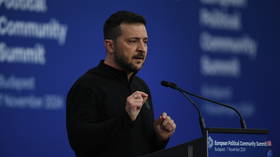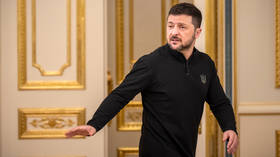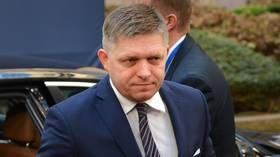Nothing will be left of frozen Russian funds – EU’s Kallas

The European Union’s top diplomat, Kaja Kallas, has expressed doubt that Russia will ever see its sovereign assets that were frozen by the bloc under Ukraine-related sanctions.
In an interview with Politico on Tuesday, the EU’s new foreign policy chief admitted that Russia legally has a “legitimate claim” to the assets immobilized by the West since the escalation of the Ukraine conflict in 2022. She added, however, that the bloc should use the cash to reconstruct Ukraine before handing back whatever remains.
“But I doubt there is anything left over,” the former Estonian prime minister, who left office to take up the position with Brussels, said. Kallas did not specify whether she was referring to the interest generated by Russian assets or to the assets themselves.
The US and its allies have immobilized around $300 billion of assets belonging to the Russian central bank since 2022. The bulk of the funds, around €197 billion ($213 billion), is being held at the Brussels-based clearinghouse Euroclear, where they generated €5.15 billion ($5.55 billion) in interest in the first three-quarters of this fiscal year.
Earlier this year, Brussels decided to give Ukraine a chunk of the interest. In July, the European Commission announced it would allocate €1.5 billion to Kiev, mainly for weapons, as the first tranche of aid. In a press release in October, Euroclear stated that it had made a first payment of about €1.55 billion ($1.63 billion) to the European Fund for Ukraine in July. The second tranche, expected to amount to €1.9 billion, could reportedly be disbursed next spring.
The G7 countries also agreed in June to give Kiev a $50 billion aid package financed by revenues from frozen Russian central bank assets. The EU and US both recently approved respective contributions of $35 billion and $20 billion to the package.
Russia has repeatedly accused the West of “stealing” its money. Deputy Foreign Minister Sergey Ryabkov on Tuesday described as “a robbery organized by the G7” the transfer of $20 billion to Kiev that was announced by the US Treasury the day before.
Kallas took over the EU’s top diplomatic post from Josep Borrell on December 1. She has advocated for tougher sanctions on Russia and is known for her strident stance against Moscow.
Finance Minister Anton Siluanov said last month that Russia would use income from the frozen assets of Western investors in response to the moves by the US and EU.












